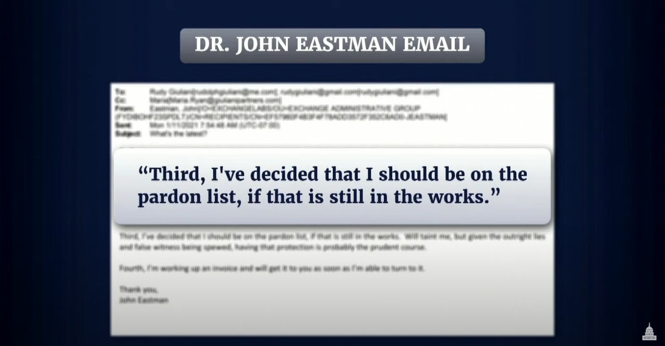The January 6 Committee’s Most Damning Revelation Yet
The most damning piece of evidence presented at today’s Select Committee hearing on the January 6 insurrection wasn’t a sound bite from a star witness, nor was it another never-before-seen video of the assault on the Capitol. The revelation amounted to a single highlighted sentence in an email sent days after the attack by one of Donald Trump’s lawyers, John Eastman, to another, Rudy Giuliani: “I’ve decided that I should be on the pardon list, if that is still in the works.”
Eastman, a conservative law professor, has long been a central figure in the January 6 saga: In memos and White House meetings, he first advanced and then sold Trump on the absurd legal theory that then–Vice President Mike Pence had the power to unilaterally reject electors from contested states. Based on Eastman’s arguments, Trump ceaselessly pressured Pence, in public and in private, to effectively overturn the will of voters and declare him the winner—a campaign that put the vice president’s life in danger on January 6 as a mob chanting “Hang Mike Pence!” descended on the Capitol.
What the committee established conclusively in its third public hearing, so neatly encapsulated by Eastman’s request for a pardon, was that Eastman knew that under the plan he’d devised, Trump was urging Pence to violate the law. And not just Eastman—everyone knew. The lawyers, aides, and assorted hangers-on who surrounded Trump in the crucial, ultimately tragic weeks between November 3 and January 6 all understood that what the defeated president was attempting was not merely contesting an election, but plotting to overturn its result.

Pence’s lawyer, Greg Jacob, testified that even as Eastman lobbied the vice president on Trump’s behalf, he repeatedly acknowledged during private conversations that his scheme for Pence to declare Trump the winner would violate the Electoral Count Act of 1887. In videotaped depositions, Pence aides said the same was true of Giuliani and Mark Meadows, Trump’s final chief of staff. Another White House attorney, Eric Herschmann, told the committee that when he pointed out to Eastman that such a move by Pence would spark widespread rioting in the streets, Eastman replied with “words to the effect of ‘There’s been violence in the history of our country in order to protect the democracy, or to protect the republic.’”
[Quinta Jurecic: The January 6 committee is not messing around]
The beginning of today’s hearing was notable for how unreservedly a committee created by and loaded with Democrats held up as a hero the former Republican vice president whose devotion to Trump the party once mocked and whose hostility to LGBTQ rights its leaders continue to revile. “We are fortunate for Mr. Pence’s courage on January 6,” the committee chair, Representative Bennie Thompson of Mississippi, said. “Thanks in part to Mike Pence, our democracy withstood Donald Trump’s scheme and the violence of January 6.” The praise seemed designed to create the illusion of bipartisanship, and to serve as an invitation for Pence himself to testify before the panel, an event that would capture public attention even more than the highly rated hearings already have. (Committee aides did not respond when I asked if they had asked him to appear.)
Yet the central significance remains the case against Trump and those who enabled his bid to remain in power. For all of Eastman’s apparent responsibility for January 6, he came across more sympathetically than the former president did today. Jacob testified that at one point in early January, Eastman recommended against having Pence reject the electors only to reverse himself, on Trump’s order, the very next day. Then, even after the horror of the Capitol siege, Herschmann said Eastman continued to press the Trump campaign to pursue its effort to overturn the results in key states, including Georgia. Herschmann said he erupted at Eastman and advised him to “get a great effing criminal-defense lawyer. You’re going to need it.” Eastman seemed to finally get the message. A few days later, Eastman emailed Giuliani with his request—which Trump never granted—for a presidential pardon.
